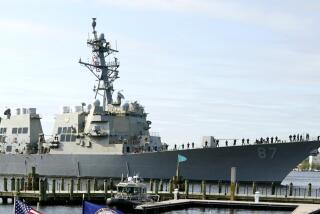Insurers Cut Premiums for Gulf-Bound Cargo : Shipping: Industry executives believe Iraq now poses less of a threat.
- Share via
In a move reflecting doubts that Iraq can effectively strike commercial targets in the Persian Gulf, insurance underwriters sharply lowered premium rates Friday for marine and air cargo going into the war-torn area.
Reports coming out of London indicated that Lloyd’s of London, the world’s largest group of insurance underwriters, cut rates by half for marine cargo going into Qatar, Bahrain and several other Gulf ports. Marine rates into Iran were cut even further--to 0.75% of the value of goods shipped, compared to the previous day’s rate of about 2%.
Air cargo rates were also cut sharply for shipments going into Israel.
Insurance executives noted that cargo rates generally have been sliding because of the perception that--despite previous threats--Iraqi President Saddam Hussein’s military forces are not able to wipe out commercial trade in the Gulf.
“There has not been a lot of catastrophic damage done to cargo in these areas,” said David Avasthi, president of Universal Investment Consultants, a Miami-based insurance firm that underwrites political risks.
Every day that passes without damage to commercial shipping or air cargo traffic makes underwriters more convinced that the risks are diminishing, he said.
Nevertheless, rates are still far higher than they were before the outbreak of hostilities, and they are likely to remain so as long as fighting continues in the Persian Gulf.
Companies shipping goods in and out of the Gulf region currently must pay 0.125% to 2% of the value of the goods shipped for war-risk insurance. The rate depends on the port to which the goods are going and when they are being shipped. But all insurance premiums are at least twice as costly as before Jan. 15, the United Nations’ deadline for Iraq’s withdrawal from Kuwait--some as much as 10 times more.
Moreover, insurance rates have become nearly as volatile as oil and stock prices, soaring and plunging on every fragment of war news.
Indeed, companies say they can no longer secure insurance for ships going into the Gulf well in advance, as they have done in the past. Now insurance quotes are not available until the day before the ship sails.
“Normally, you would have published rates that are relatively stable,” said Glen Craatz, a spokesman for Chevron Shipping Co. “Right now, nothing is published. Rates are subject to individual negotiation, and (insurers) won’t begin negotiating with you until your vessel is within 24 hours of entering the restricted zone.”
While cargo rates have fallen, insurance premiums for commercial aircraft generally remain prohibitively high or altogether unavailable. Insurers say insurance rates on passenger planes are not likely to drop for some time, largely because of the threat of terrorism.
Most passenger carriers going into Saudi Arabia, Israel, Iran, Iraq and Turkey have canceled all or the bulk of their flights because of the combination of high insurance premiums, plunging consumer demand and safety concerns.
Several carriers, including Pan American World Airways and KLM Royal Dutch Airlines, said even if insurance rates were to plunge to pre-conflict levels, they would not immediately resume flights.
“When we first suspended service into the area, it was because of insurance rates,” said Elizabeth Hlinko, a Pan Am spokeswoman. “But since then, it has become a matter of safety concerns. Flights will continue to be suspended until tensions end.”
More to Read
Sign up for Essential California
The most important California stories and recommendations in your inbox every morning.
You may occasionally receive promotional content from the Los Angeles Times.













